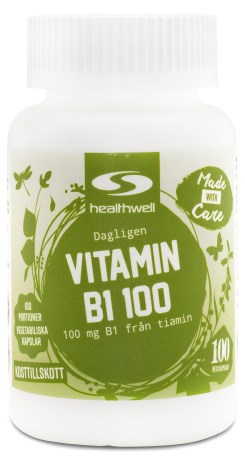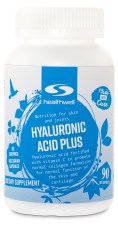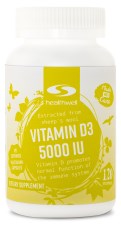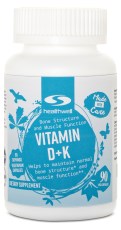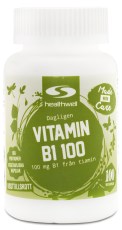
Vitamin B1 100
– For normal metabolism
– Metabolism & energy conversion
- Product description
- Nutritional content
Thiamine for your body’s metabolism
Vitamin B1 100 from Healthwell is a supplement of vitamin B1 in vegetable capsules. Vitamin B1, also known as thiamine, is a water-soluble vitamin with great significance for the body's metabolism of protein, carbohydrates, and fat. Thiamine is found naturally in foods such as pork, offal, and sunflower seeds, as well as in breakfast cereal, muesli, and bread. The vitamin contributes to normal cardiac function, to the body's psychological functions, and to normal function of the nervous system. The body needs B1 in order to convert the food we eat into energy. All the body's cells are dependent on vitamin B1, which is primarily active in the brain and its carbohydrate metabolism. The cells, in turn, use the vitamin to break down the carbohydrates to glucose, which is then converted into energy.
- 100 mg of vitamin B1 per capsule
- Contributes to normal metabolism and digestion
- For a normally functioning immune system
- Vegetable capsules
What is thiamine?
Thiamine, or vitamin B1, is an important vitamin for all the body's cells. The vitamin was named by researchers as it was the first vitamin B discovered. However, today, it is also known as thiamine. Thiamine deficiency may cause symptoms such as constipation and digestive problems, but it can also affect the ability to concentrate. Today, thiamine deficiency is rare in Sweden, thanks to the vitamin being found in our most common foods. However, it may occur in, for example, those who consume excessive amounts of alcohol. The vitamin is important for the body's digestion and metabolism of the fats, carbohydrates, and proteins we get through food, and it also helps the body's cells and tissues maintain normal health.
The European Food Safety Authority (EFSA) has identified a connection between thiamine and:
- normal cardiac health
- a normally functioning nervous system/li>
- energy-conserving metabolism
Thiamine in food
We primarily get vitamin B1 through our breakfast in the form of bread and breakfast cereals, but also through food made with pork or offal. Like many other vitamins, minerals, and other nutrients, thiamine is sensitive to high temperatures and can thus lose its nutritional and vitamin content. When cooking foods rich in vitamin B1, you should therefore remember to wok, lightly boil, steam boil or lightly fry to retain the nutrients, as the vitamin is destroyed when heated to more than 100 degrees. For example, when boiling vegetables, about 60% of the natural thiamine disappear. If you often eat food cooked at high temperatures for a long time, a vitamin B1 supplement can ensure your intake. In contrast, thiamine is resistant to freezing.



